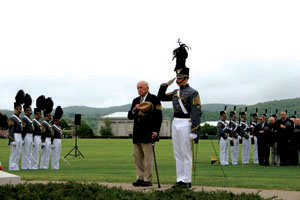The West Point Association of Graduates (WPAOG) has named the 2005 recipients of the Distinguished Graduate Award. This annual award has been bestowed upon those West Point graduates whose character, distinguished service, and stature draw wholesome comparison to the qualities for which West Point strives, in keeping with its motto: “Duty, Honor, Country.” View photos here. The 2005 Distinguished Graduate Award Recipients are:
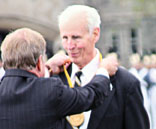
LTG (R) Frank A. Camm Jan ’43
Lieutenant General Frank A. Camm began his distinguished thirty-four year career as an Engineer officer with the 303rd Engineer Combat Battalion, fighting in the deadly Hurtgen Forest during the Battle of the Bulge in World War II. In the Korean War, he commanded the 2nd Engineer Combat Battalion, and in his third war, he was instrumental in the installation of the “McNamara Line,” an array of sophisticated electronic sensors, in Vietnam. When he retired in 1977, it was only to continue serving his country as Deputy Director of the Central Intelligence Agency for Collection, followed by two years as Associate Director of the Federal Emergency Management Agency. He then turned his boundless energies toward his groundbreaking role as President of the Army Retirement Residence Foundation and working with the Association of Graduates.
Read More
As a young Engineer officer in World War II, after fighting his company as Infantry and successfully frustrating the German attack through the Ardennes Forest towards Liege, Belgium, his 78th Infantry Division captured the strategically important Roer River dams, and his Engineers inspected them for explosive charges so that the Division could continue into the Rhine River Valley. Reaching the Ludendorf Bridge at Remagen, his company of Engineers was the first to cross the Rhine with all equipment. Then, taking advantage of captured enemy boats, he ferried wounded soldiers west and then brought artillery phone lines back east, giving the defending American forces access to accurate artillery fires to stop the initial enemy counterattack against the hastily assembled bridgehead. His leadership in these and other battles resulted in the award of three Bronze Stars, including one for valor.
After the war, he played a key role in the development of our Nation’s nuclear deterrence during the Cold War as a Sandia Pioneer, one of sixty Army officers hand-picked by Lieutenant General Leslie R. Groves to assure the availability of technically reliable nuclear warheads for the Army, Navy, and Air Force delivery systems when the civilian nuclear scientists departed the famous Manhattan Project. He commanded the first atomic bomb assembly team, and it was singularly successful in its highly classified mission of ensuring that the complex, near-one-of-a-kind devices could be transported around the globe and quickly assembled until more rugged, mass-produced and reliable devices were forthcoming. He also played a key role in the nuclear tests in the Pacific.
Back in the trenches during the Korean War, in 1953-54 he commanded the 2nd Engineer Combat Battalion and received another award of the Bronze Star.
In 1957-60, he served as the first nuclear planner in the office of the Deputy Chief of Staff for Operations, War Plans, and during 1963-67 was director of Tactical Nuclear Warfare in the office of the Secretary of Defense. Involvement in his third hot war came during 1967-68 in Vietnam, when he was assigned as project manager of the highly sophisticated, electronic sensor-driven “McNamara Line.” During the battle of Khe Sanh, he initiated the use of electronic sensors to detect enemy movement on the tactical battlefield, thereby permitting troops on the ground to bring accurate fire on the hidden enemy and inflict significant casualties.
As commander of the South Pacific Engineer Division in 1970-72, he was commended by the City of Los Angeles for his assistance in rescue operations during the disastrous San Fernando earthquake of 1971.
His final assignment in the nuclear arena was as the Director of Military Applications, Atomic Energy Commission, 1972-73. After additional duty on the Army staff and promotion to lieutenant general in 1975, he was assigned as Deputy Commanding General of the Training and Doctrine Command, responsible for twenty-six Army schools. Upon retirement in 1977, he immediately was appointed to head the collection of national human, signals, and photo intelligence for the Central Intelligence Agency until 1979, when the president appointed him to direct Civil Defense, Continuity of Government, Mobilization of Civilian Sector, the National Stockpile, and planning for natural disasters in the Federal Emergency Management Agency.
Fully retired in 1981, he nonetheless immersed himself in three major projects. The first was as pro bono president of the Army Retirement Residence Foundation, resulting in the design and construction of The Fairfax, the flagship retirement community of more than fifty, now operated by Marriott. The second was the conception, design, and construction of Herbert Hall at West Point as a necessary and appropriate office for the greatly expanded activities of the Association of Graduates. Typically, he helped insure that the first major building program for the Association was brought in on time and within budget. Finally, he conceived and executed a physical embodiment of West Point’s motto, “Duty, Honor, Country,” as the 50th Reunion gift of his class. “The Constitution Corner,” as it is known, clearly demonstrates, through quotations from military oaths and key documents, the principles of selfless service to the Constitution that underlie the duties of all officers.
Accordingly, it is with great pride that the Association of Graduates presents the 2005 Distinguished Graduate Award to an officer of the highest ethical and professional standards, Frank Ambler Camm, Class of January 1943.
Thomas B. Dyer
Chairman and CEO
GEN (R) Sam S. Walker ’46
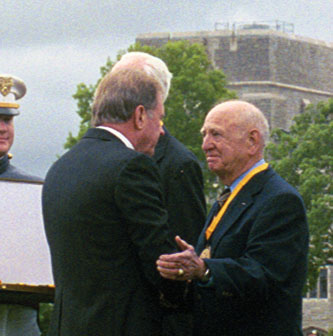
As an outstanding combat leader and commander, educator, and soldier-statesman, General Sam Sims Walker has given a lifetime of exemplary service to the Nation, the United States Army, and his fellow soldiers, epitomizing the ideals of “Duty, Honor, Country.”
Commissioned into the Infantry upon graduation, General Walker’s career began with an assignment as a platoon leader in the 11th Airborne Division in Japan, and over the course of the next 32 years, he commanded at every level. His leadership skills, honed at West Point, came into sharp focus on the battlefield in Korea, when, as a company commander in the 24th Division, he received the first of two Silver Stars for heroism. He returned from Korea in 1951 and was assigned as an instructor at the Infantry School at Ft. Benning.
Read More
Following graduation from the Command and General Staff College in 1957, General Walker was assigned to a number of highly responsible positions, including aide de camp to the Chief of Staff of the Army, company tactical officer at West Point, and Secretary of the General Staff of the United Nations Command/US Forces, Korea. In 1963 he was selected to attend the National War College, finishing the course as a Distinguished Graduate. Following a year in command of the 1st Battalion, 30th Infantry in Germany, he once again moved to the sound of the guns by volunteering for combat duty in Vietnam. There, he became G3 of the First Infantry Division, and then, while still a lieutenant colonel, took command of a brigade. While in command of this brigade, he earned the second of his Silver Stars for extraordinary heroism under fire.
On his return to the United States then-Colonel Walker attended the Advanced Management Program at Harvard and was assigned to the Office of the Vice Chief of Staff of the Army as Chief of Force Readiness, Force Planning, and Analysis. In this position he developed a method for predicting active and reserve forces’ readiness under mobilization and non-mobilization conditions that was approved by the Secretary of Defense, Secretary of the Army, and Chief of Staff as a key management tool. Following this service he was selected personally by the Army Chief of Staff to represent his service on the Council of Foreign Relations.
Promoted to Brigadier General in 1968, he was assigned as the Assistant Division Commander of the 82d Airborne Division. A year later General Walker became the 54th Commandant of Cadets. At West Point he again displayed his distinguished leadership during an unsettling period for the Academy. The Fourth Class System, and the Honor Code were being challenged from within and without the Academy. His rational, focused approach to the problems faced by the Academy during this difficult time provided a roadmap to follow in meeting challenges while maintaining the fundamental core values of “Duty, Honor, Country.”
Following his tour as Commandant of Cadets, he was promoted to Major General and given command of the 3d Infantry Division in Germany. As the Division Commander his concern for soldiers’ well-being contributed greatly to the restoring of soldier morale and combat effectiveness resulting from Vietnam war-related personnel turbulence. He commanded the Division for two years and in 1974 was selected to be the US Commander in Berlin. There, he demonstrated a statesman-like talent in dealing with German officials and the Four Powers represented in the city. He also enhanced contingency planning for the defense of West Berlin and greatly improved allied coordination for the execution of vital contingencies.
Promoted to Lieutenant General, General Walker served from 1975 to 1977 as the Deputy Commanding General, Forces Command at Ft. McPherson, Georgia. Here he shared responsibility for the readiness of Army forces that would be deployed throughout the world to augment the Combatant Commands. In 1977 General Walker was again selected for promotion, this time to the rank of General, and at the same time was appointed as Commanding General, Allied Land Forces Southeast, with headquarters in Turkey. This Command is responsible for the defense of NATO’s southern flank, and General Walker was effective in improving regional command coordination, thus contributing significantly to the enhancement of US-Turkish relations. He was awarded the Defense Distinguished Service Medal for his achievements, and the Distinguished Service Medal of the Turkish Armed Forces.
Following his retirement from active duty in 1981, General Walker returned to academia as the 11th Superintendent of the Virginia Military Institute in Lexington, Virginia. At VMI, General Walker made enormous contributions to the governance of the Institute at a time when it was seeking to move forward on a number of fronts. He also reformed certain aspects of the Fourth Class System that were detrimental to the military training and character development of cadets. As a result of far-reaching improvements he made in academics, administration and physical facilities, VMI reinforced its status as a premier military institution of higher learning.
General Walker served for many years as a Trustee-at-Large of the Association of Graduates, and in appreciation for his dedicated service was designated a Trustee Emeritus in 1996. He is also a Board member of the Advisory Council of the US-Korea Foundation, the Council on US-Korea Security Studies, the National D-Day Museum, and American Friends of Turkey.
Sam Walker’s distinguished record of achievement as a combat leader in Korea and Vietnam, as an educator at West Point and VMI, and as a soldier-statesman in Berlin and in NATO’s Allied Land Forces Southeast epitomizes the highest ideals and values of selfless service. It is with great pride that the Association of Graduates of the United States Military Academy presents the 2005 Distinguished Graduate Award to General Sam Sims Walker, USMA Class of 1946.
Thomas B. Dyer
Chairman and CEO
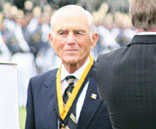
GEN (R) John A. Wickham, Jr. ’50
Throughout a lifetime marked by extraordinary achievements, General John A. Wickham, Jr. has exemplified the ideals of West Point. In a remarkable display of professional excellence and ethical leadership, he has provided selfless service to the United States Army, its soldiers, their families, and the Nation for over five decades. His tenure as Chief of Staff of the Army resulted in his being named by Army Times as one of the ten leaders who most changed the Army. He is truly a Distinguished Graduate of the United States Military Academy.
Read More
Upon graduation from West Point, John Wickham was commissioned a second lieutenant and assigned to the 18th Infantry Regiment and, subsequently, the 6th Infantry Regiment. He served as a platoon leader and company executive officer in the 511th Airborne Infantry Regiment and was an aide-de-camp in the 37th and 10th Infantry Divisions. After receiving two master’s degrees from Harvard University, he returned to West Point to teach in the Department of Social Sciences from 1956-1960. Thereafter, he served as the operations officer of the 1st Battle Group, 5th Cavalry, in Korea, and later commanded the 5th Battalion, 7th Cavalry Regiment, 1st Cavalry Division in Vietnam. In the latter position, he was seriously wounded during a North Vietnamese attack, but remained on the radio throughout the night, coordinating fire support to prevent his firebase from being overrun. For his heroic actions, he received the Purple Heart and Silver Star.
Following an overseas command of the 1st Brigade, 3rd Infantry Division, he returned to Vietnam as the Deputy Chief of Staff, MACV. Next, he commanded the 101st Airborne Division and following that, became Commander in Chief of the United Nations Command and of the United States Forces and Eighth Army, where, in 1979, General Wickham played a leading role after the assassination of President Park Chung Hee in diffusing public criticism of United States, both politically and militarily.
His staff assignments included Deputy Chief of Staff of MACV, Deputy Chief of Staff of the Four Party Joint Military Commission in Saigon, and Director of the Joint Staff. He also served as senior military assistant to Secretaries of Defense Schlesinger and Rumsfeld.
In 1983, President Reagan appointed John Wickham as Chief of Staff of the United States Army, and in that position he had an enormous positive impact on the Army. He focused much of his attention on five initiatives that resulted in lasting change. He implemented the Army Family Action Plan to ensure that families were receiving the care and support they deserved. He focused on leadership development and officer education, thus significantly improving the professionalism of the military force. He implemented the Joint Warfighting Doctrine that held the Soviet Union at bay during the Cold War and proved to be brilliantly successful in Operation Desert Storm. Finally, he oversaw the creation of the Aviation and Special Forces branches.
John Wickham also fostered technological advances, including lighter weapons systems, longer range howitzers, and improved avionics. His insight led to the integration of command, control, communications, computers, and intelligence systems, one of the early steps in the Army’s information-dominance effort. His emphasis on strategic deployability resulted in the creation of two additional light infantry divisions, and one of these, the 10th Mountain Division, has been instrumental in fighting the global war on terrorism. His emphasis on developing the Round Out Brigade led to a greater reliance on the Army Reserve in warfighting effectiveness. Finally, John Wickham’s care in the stewardship of Army resources resulted not only in monetary savings, but also in a wide range of improved benefits for soldiers.
General Wickham retired from the Army in 1987 after 37 years of active service. His awards include eight Distinguished Service Medals, two Silver Stars, four Legions of Merit, eleven Air Medals, the Bronze Star for Valor, and the Purple Heart. He continues to be an outstanding citizen, serving as a Town Council President in Sun City, Arizona and as an elder at his church. He served as Chairman of the Board for Honeywell Federal Systems and Nortel Federal Systems. His extensive background led him to be named the vice chairman for the United States-China National Committee, a body focusing on security issues. He has served as a member of the Secretary of Defense Policy Board, providing exceptional input on operational deployments and personnel issues. He is also an active member of the United Way in both Virginia and Tucson.
Through a lifetime of service to the Nation, this superb son of West Point has been a truly outstanding leader who has embodied the ideals, “Duty, Honor, Country.” Accordingly, the Association of Graduates takes great pride in presenting the 2005 Distinguished Graduate Award to John A. Wickham, USMA Class of 1950.
Thomas B. Dyer
Chairman and CEO
MG (R) Neal Creighton ’53
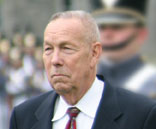
Major General Neal Creighton began his distinguished thirty-one year military career as a young Armor officer patrolling the East German border during the height of the Cold War, proved his combat leadership and physical courage as commander of the 3rd Squadron, 11th Armored Cavalry Regiment, in seven battles during the Tet Offensive of 1968, and later commanded the 1st Infantry Division (Mechanized). Upon retirement, his managerial expertise and commitment to excellence were proven in a number of impressive civilian and quasi-military pursuits, including city manager of Asheville, North Carolina, president of the McCormick Tribune Foundation, interim president of Westminster College, executive director of the World War I Liberty Memorial and Museum project, and campaign director for the National Museum of the United States Army.
Read More
Patrolling the border with East Germany during some of the most ominous years of the Cold War, as both a platoon leader and later as a troop commander, provided the most realistic of training for a young Armor officer. This was followed by language training at Middlebury College and the University of Madrid in preparation for three years as a member of the Department of Foreign Languages and further utilization with the Military Advisory Assistance Group, Dominican Republic, in 1963-64, and with Southern Command for two additional years. This was followed by his Vietnam tour as a squadron commander, during which he was awarded the Silver Star for gallantry in action and the Bronze Star for valor while the 11th Cavalry Regiment earned the Valorous Unit Award for its actions during the 1968 Tet Offensive.
Upon returning to the United States, he served with the office of the Deputy Chief of Staff for Operations and in the office of the Undersecretary of the Army, making perhaps his greatest contribution in regards to the Panama Canal situation, confirming his interest in, and knowledge of, Latin American affairs that continued long after his retirement from the military. He returned to Germany in 1973 and assumed command of a brigade of the 3rd Infantry Division in 1974. After another tour in the Pentagon, he commanded the 1st Infantry Division (Forward) in Germany before eventually taking command of the entire division.
Upon retiring from the Army in 1984, he served for a year as the city manager of Asheville, initiating a major renewal of the downtown area before embarking upon a 14-year career with the McCormick Tribune Foundation. While heading the Foundation, he secured its financial future, constantly served as an interface between the military and civilian sectors, crusaded for the freedom of the press in Latin America, and contributed to the education of underprivileged youngsters in Chicago’s poorest areas. In addition to such diverse activities as visiting newspapermen in Communist Cuba, serving as an election observer in Panama and Nicaragua, and hosting commemorations of the 75th anniversary of World War I, the 50th anniversary of D-Day, and the 50th reunion of the Tuskegee Airmen, he was instrumental in the development and adoption of the Declaration of Chapultepec—a Magna Carta of free speech and free press for Latin America—and in the encouragement of conferences between the military and the media that led to the adoption of the concept of “embedded reporters” during Operation Iraqi Freedom.
Within Chicago’s housing projects and low-income areas, he focused the activities of the McCormick Tribune Foundation on early childhood education. As a result of these programs, the area has the largest number of accredited early childhood education centers in the Nation. Additionally, he initiated a Chicago-area AMERICORPS program that gives West Point cadets the opportunity to teach and mentor summer school students.
Upon departing the McCormick Tribune Foundation, he accepted the position of interim president of Westminster College, an institution of higher learning in Fulton, Missouri, initiated a much-needed capital campaign, and assisted in the selection of a permanent successor. Soon, however, his expertise was required by the leaders of Kansas City, Missouri, to organize a $90 million project to restore the Nation’s largest World War I Memorial/Museum, the Liberty Memorial. Agreeing to accept the position of executive director for one year, he raised funds to renovate the memorial and expand the museum, established a governance mechanism, and again assisted in the selection of a qualified successor.
Elected to a three-year term on the board of directors of the Army Historical Foundation in the fall of 2002, he did not realize at the time that he would soon face his greatest challenge to date. In May of 2004, the Foundation contracted with the Department of the Army to act as the official fundraiser for the planned National Museum of the United States Army. A month later, Major General Creighton was asked to lead the $200 million campaign and is now serving in that capacity.
Accordingly, it is with great pride that the Association of Graduates presents the 2005 Distinguished Graduate Award to a soldier and statesman who daily sets new standards of selfless service, Neal Creighton, Class of 1953.
Thomas B. Dyer
Chairman and CEO
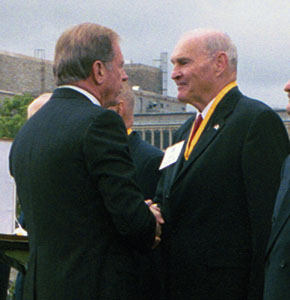
LTG (R) Dave R. Palmer ’56
Throughout a lifetime of service to the Nation, Lieutenant General Dave R. Palmer has distinguished himself as a member of the Long Gray Line and brought great credit to the United States Military Academy. He was a commander and staff officer whose Army service spanned more than three decades. He has been an author, lecturer, educator, and community servant, whose tireless efforts have done much to preserve the legacy and enrich the public’s understanding of the United States Army. Most notably, as the 53rd Superintendent of the United States Military Academy, his vision guided far-reaching and enduring advances at West Point. Dave Palmer has repeatedly set the azimuth for change with a wisdom grounded in history and informed by his prescient view of the future. His extraordinary service has done much to promote the welfare of West Point and to further the ideals: “Duty, Honor, Country.”
Read More
Born in Ada, Oklahoma, Dave Palmer graduated from West Point in the Class of 1956. He was commissioned a second lieutenant of Armor and embarked on a military career that nearly spanned the Cold War era. Following an assignment to Berlin, he commanded a tank company in the 1st Armored Division. From 1969 to 1971, he commanded the 2nd Battalion, 33rd Armor in the 3rd Armored Division, U.S. Army, Europe. He commanded the 1st Brigade of the 2nd Armored Division, Fort Hood, Texas, from 1976 to 1977 and the 1st Armored Division in Germany from 1985 to 1986. He also served two tours in Vietnam, one of these at the Vietnamese National Military Academy. Dave Palmer’s assignments in military academia also included a tour as an instructor in the Department of Military Art and Engineering and as the Deputy Commandant of the U.S. Army Command and General Staff College. He is remembered by contemporaries as a leader of great wisdom, vision, integrity, and character, invariably uplifting those serving with him.
It was at West Point, however, that Lieutenant General Palmer’s achievements were especially significant and enduring. As Superintendent from 1986 to 1991, Dave Palmer set a course that turned West Point toward its third century of service to the Nation. He directed the articulation of an Academy purpose emphasizing the development of leaders of character. He also established the ground-breaking Cadet Leadership Development System, which replaced the Fourth Class System with a progressive four-year leadership program emphasizing development through ever increasing challenges and responsibilities based on analogous duty positions in Army units. He guided the reorganization of aspects of the academic program and several departments, changes reflecting his analysis of the challenges Army officers would face in increasingly complex, technology-driven 21st-century global operations. His analysis of the Academy’s mission brought balance and focus to the three-program approach to cadet development—military, academic, and physical. In this regard he also recognized the criticality of physical fitness and directed that every cadet would participate in a contact sport. Recognizing the stresses modern society was placing on the Cadet Honor System, he commissioned a study of honor at West Point that led to increased emphasis on its developmental aspects.
Lieutenant General Palmer’s strategic plan for the West Point installation preserved historical elements of the Plain and Cadet Area, enhancing order and reducing congestion. He guided the implementation of a policy for naming government-funded athletic facilities after graduates who had been exceptional athletes and leaders at West Point and who had died relatively young in combat. His vision also initiated a dramatic increase in the use of private funds for new facilities, cadet programs, and academic and leadership opportunities, as well as the construction of the Herbert Alumni Center and the growth of the Association of Graduates’ staff. This remarkable record of Dave Palmer’s achievements places him in the first rank of those who have headed the Military Academy.
Dave Palmer retired from the Army in 1991, joining the Board of Directors of Walden University in 1992. From 1995 to 1999, he served as president of Walden University, where he pioneered providing mid-career professional, working adults with the opportunity to earn advanced degrees through accredited high-quality, distance learning methods. His efforts doubled the enrollment of the university, which now has more than 10,000 students. From 1999 to 2000 he was Chief Executive Officer of Walden e-Learning, Incorporated.
General Palmer has continued to benefit others with his vision, organizational skills and knowledge, often without compensation. He was the catalyst in organizing the West Point Society of the Heart of Texas, and he lectures widely and frequently appears on television as a military analyst and historian. Among his writings are books on Washington’s tactics during the Revolutionary War, the development of our Nation in the years following the Revolutionary War, the U.S. Army in Vietnam, and George Washington’s military career. His first book, The River and the Rock: The History of Fortress West Point, 1775-1783, was published in 1969 and was recognized as the definitive history of the Hudson River and its West Point bastion during the War of Independence.
Lieutenant General Dave R. Palmer has been the recipient of numerous military awards and medals, but it is above all for his character, integrity, vision, selfless service, and contributions to West Point, the United States Army, and the Nation that he is recognized with great pride by the members of the Long Gray Line as a Distinguished Graduate of the United States Military Academy.
Thomas B. Dyer
Chairman and CEO
Mr. R. James Nicholson ’61
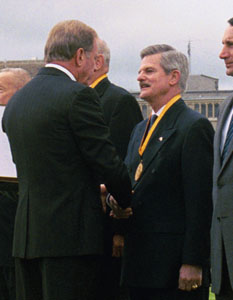
As an Airborne Ranger who served in Vietnam, a successful attorney and outstanding business leader, the Chairman of the Republican National Committee, the United States Ambassador to the Holy See in Rome, and now the Secretary of Veterans Affairs, R. James Nicholson has led a life filled with over forty years’ worth of extraordinary achievements. President George Bush said of him: “When I think of Jim Nicholson, I think about one of the finest public servants I have ever known. I think about honor, decency and integrity.” He has well and truly embodied the Academy’s ideals: “Duty, Honor, Country.”
Read More
Raised in poverty on a tenant farm in Iowa, Jim Nicholson could not have had a more inauspicious beginning to his life. The third of seven children, he began working at age seven, and at age fifteen he became the sole provider for the family. Commissioned in the Infantry upon graduation from West Point, his early service included command of an Infantry company and assignment as senior advisor to a Vietnamese battalion in combat. He was awarded the Bronze Star Medal, the Air Medal with Oak Leaf Cluster, the Combat Infantryman’s Badge, and the Vietnamese Cross of Gallantry.
Returning to the United States, Jim Nicholson was assigned to West Point. In 1970 he left active duty, but served the next twenty-two years in the Army Reserve, retiring in 1991 with the rank of colonel. After earning a law degree from the University of Denver, Jim Nicholson joined a prestigious law firm and became a full partner in two years. In 1978, he left the practice of law and became a developer of master-planned residential communities, and in 1987, a builder of custom homes.
Despite the pressures of an expanding and successful business, Jim was deeply involved in a wide variety of non-profit and charitable activities. He was President of the West Point Society of Denver, founded the West Point Parents’ Club of Denver, and was instrumental in increasing the number of cadets appointed from Colorado. He chaired the Volunteers of America in Colorado; provided leadership to the Listen Foundation, which helped hearing-impaired children; chaired a Community Concerns Committee of the Denver Bar Association; became the primary spokesman for affordable housing in Denver; and established himself as one of Colorado’s outstanding leaders.
Elected a national committeeman from Colorado to the Republican National Committee (RNC) in 1986, Jim Nicholson became vice-chairman of the RNC in 1993, and four years later he was elected Chairman. Under his strong leadership, the Republican party began to rebound from the disastrous losses of 1996 and in the process, Jim Nicholson’s name became a byword for integrity and meticulous adherence to rules and ethics. In 2000, the Republican party won the Presidency, a majority in the Congress, and a majority of governorships and state legislatures – a feat not accomplished in nearly fifty years. During his four years as Chairman, the RNC also set all-time records for fundraising. While Chairman, Jim Nicholson co-chaired the International Institute for Democracies, a worldwide organization of national political parties, and his visits to many nascent democracies in Europe and Central America helped to solidify their commitment to a democratic form of government.
In 2001, President Bush appointed Jim Nicholson to be Ambassador to the Holy See in Rome. When he accepted the appointment, he stated that he wanted to become more involved in helping America become a moral leader as well as a temporal power. Guided by America’s foreign policy objective of enhancing human dignity, Ambassador Nicholson immediately grasped the importance and potential of a strong relationship between the United States and the Holy See. He obtained the support of the Holy See for U.S. efforts to fight terrorism; he orchestrated three visits by President Bush with Pope John Paul II, resulting in a close personal relationship between the two world leaders; and he was a strong voice in Europe for human dignity. Ambassador Nicholson convened an international conference on the trafficking of humans, highlighting the problems of 21st century slavery and human rights issues, and his zealous commitment to helping the hundreds of million undernourished and starving people in Africa and Asia has gained the support of the Holy See. At the conclusion of his tour as Ambassador, a senior diplomat said of Jim Nicholson, “No other man could have represented our Nation with such moral conviction; no other representative could have had as great an influence.”
Throughout a lifetime of distinguished service, Jim Nicholson’s career has been one of selfless contributions and dedication to the ideals expressed in the West Point motto: “Duty, Honor, Country.” His moral values, transparent integrity, and commitment to humanity set the highest possible standards of excellence. Accordingly, the Association of Graduates takes great pride in presenting the 2005 Distinguished Graduate Award to R. James Nicholson, USMA Class of 1961.
Thomas B. Dyer
Chairman and CEO
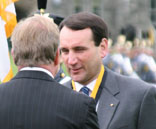
Mr. Michael W. Krzyzewski ’69
Michael W. Krzyzewski has achieved an extraordinary coaching record in basketball and at the same time, has increased national awareness of the principles of “Duty, Honor, Country.” In doing so, Mike Krzyzewski has brought great credit upon the United States Military Academy. In the eyes of the sports world and those of the Long Gray Line, he is a truly distinguished graduate of West Point.
Read More
As a cadet, he was a three-year basketball letterman and played on two Army basketball teams that were selected to participate in the National Invitational Tournament (NIT). During his First Class year (1968-1969), he was selected as Captain of the Army basketball team, named to the second team All-NIT (1969), and participated in the North-South Game (1969). As a West Point varsity basketball player, he belonged to a team that never lost to the United States Naval Academy.
Upon graduation from USMA, he was commissioned as a second lieutenant in the Field Artillery. He served at Fort Carson, Colorado, the Republic of South Korea, and at the United States Military Academy Preparatory School. During this period, he began to hone his coaching skills by working with service teams and by serving as head basketball coach at the Prep School. In 1974, Captain Krzyzewski resigned from the Army and immediately joined Bobby Knight’s staff as a graduate assistant coach at the University of Indiana. That basketball season, the Indiana basketball team posted a 31-1 overall record.
In 1975, Mike Krzyzewski returned to West Point as the Head Basketball Coach. While at Army, he led his teams to an overall record of 73 wins and 59 losses and took the cadets to one berth in the National Invitational Tournament. Importantly, during this five-year stint at the helm of Army basketball, he achieved a record of four victories and only one loss against Navy.
In 1980, he became the head basketball coach at Duke University. By the conclusion of the 2005 basketball season, Mike had completed 25 years of coaching at Duke, where his achievements have been truly remarkable. Of particular note is his success in the Atlantic Coast Conference (ACC) and on the national level. As Duke’s all-time winningest coach, he has built a basketball dynasty that few programs in the history of the game can match. His achievements in the ACC include ten ACC regular season championships and nine ACC Tournament championships, including titles in six of the last seven years. He has been named ACC Coach of the Year five times. At the national level, he has coached Duke to twenty-one NCAA tournament bids, and ten NCAA Final Fours, and three National Championships. He has also achieved the all-time most NCAA Tournament victories (66) and the second-highest active NCAA Tournament winning percentage (78.6%). In recognition of his excellence, he has been named National Coach of the Year twelve times and on 5 October 2001 in Springfield, Massachusetts, Coach Kryzewski was enshrined as a coach in the Naismith Basketball Hall of Fame. To date, his overall record as a Division I basketball coach is a remarkable 721 wins and 246 losses.
On the international level, Coach Krzyzewski has coached in the World University Games as well as the World Championship Games and Goodwill Games. In 1992, he was an assistant coach for America’s gold-medal-winning Olympic Team. Within the ranks of his profession, he also has been a leader, serving as President, National Association of Basketball Coaches (NABC) and member of the NCAA Basketball Issues Committee.
Above all, Coach Krzyzewski has demonstrated that victories on the court are not the only important consideration for the student-athlete. His Duke basketball players have achieved a superb graduation rate, with Coach Krzyzewski emphasizing to his players that they must grow as students and as responsible citizens.
Coach Krzyzewski has co-authored three books: A Season is a Lifetime (1992) that addresses the 1992 national championship; Five-Point Play (2001) that relives Duke’s journey toward the 2001 NCAA title; and last, Leading with the Heart (2000) emphasizing Mike’s successful strategies for basketball, business and life. Additionally, Mike has been involved in the development of numerous other videos and other publications.
The concept of “a lifetime of service” remains a hallmark of Mike Krzyzewski. Some examples of his service to the community include his efforts on behalf of the Children’s Miracle Network, the Jimmie V Foundation, the Comprehensive Cancer Center, and NABC Coaches vs Cancer. In 2000, he was the first winner of the NABC Literacy Award entitled “Verizon Reads.” He is also leading fundraising efforts for the Emily Krzyzewski Family Life Center, a local community center located near the Duke Campus and named after Mike’s mother.
Over the past thirty years, Coach Krzyzewski’s success as a basketball coach and exemplar of the ideals of West Point has become renowned. Throughout the Nation, the nickname – “Coach K” – brings to mind an extraordinary man and the rock-solid values he embodies. Through his lifetime of achievements, he has done much to burnish the national image of West Point. Accordingly, the Association of Graduates takes great pride in presenting the 2005 Distinguished Graduate Award to Michael W. Krzyzewski, USMA Class of 1969.
Thomas B. Dyer
Chairman and CEO

